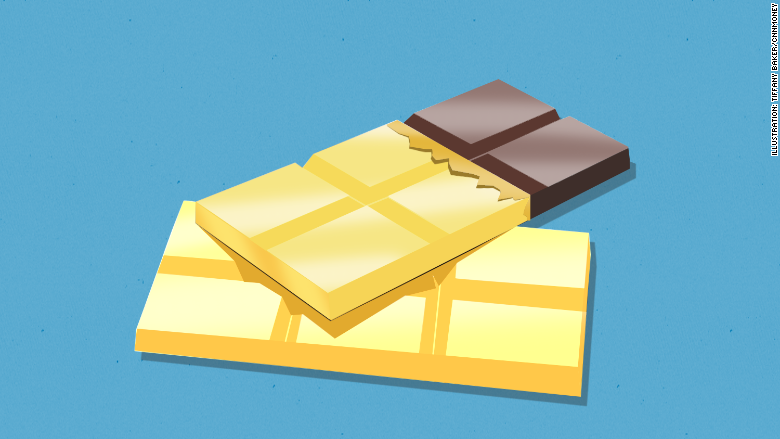
There's only one way to describe what's going on in Europe right now: bizarre.
In an unprecedented event, the yield on Nestle's corporate debt went negative this week.
That means investors are essentially willing to pay for the right to park their cash in the safety of the Swiss chocolate company. The bonds might as well come with a note saying: "In Nestle we trust."
"You're looking at something that's never happened before. It's a brand-new phenomenon," said Richard Salditt, a credit analyst at Bloomberg Intelligence. "Strange things are going on in financial markets."
No, investors haven't suddenly become addicted to chocolate bars. The euro-denominated corporate debt of other super-safe (but non-chocolate-producing) European companies like Royal Dutch Shell (RDSA) and Novartis (NVS) are also flirting with negative territory.
Even some blue-chip American companies are experiencing this negative trend. The euro-denominated bonds of Bank of America (BAC), General Electric (GE) and McDonald's (MCD) are all trading near zero, Salditt said.
All of this is a sign of the unusual times we all live in thanks to never-seen-before central bank policy. After all, normally bond investors are paid to provide financing, not the other way around.
Related: European stocks love QE
Racing below zero: So what's sparking this latest fad in finance? Central bankers around the world are experimenting with new recipes aimed at jump starting sluggish economies.
Layer on top of that problems like Greece struggling to repay its debt, and people, especially in Europe, are being forced to look for safety in unusual places.
Last year, the European Central Bank took the rare step of cutting a key interest rate below zero in a bid to revive growth. Now the ECB plans to inject at least $1.3 trillion into the financial system in an effort to fight off deflation.
Other countries are also taking very aggressive and unorthodox steps. On Thursday Denmark's central banks slashed rates further into negative territory.
"The reason that yields are so low is that central banks are engaging in a currency war via lowering policy rates through zero," said Barnaby Martin, a credit strategist at Bank of America Merrill Lynch.
Related: Apple's timing on bonds is perfect
Going negative is all the rage: The central bank moves have knocked the bond yields on a slew of countries into negative territory, including Belgium, Denmark, France, Germany, Japan and the Netherlands. Again, that means investors are basically willing to lose money when they buy government debt.
Incredibly, negative yielding bonds have been the fastest growing "asset class" in Europe over the past year, according to Bank of America Merrill Lynch. The bank estimates the total amount of euro government debt and bills yielding below zero has surged to €1.2 trillion, compared with €500 billion at the end of October and zero in June.
Martin said it's "unprecedented" to see negative yields in either corporate or sovereign bond markets.
Related: Stocks plunge but bonds are still red hot
Few choices for investors: Investors navigating these unchartered waters have to decide what to do with their money.
While banks don't (yet) actually have negative interest rates for mom-and-pop customers, people with $100 million can't just run to their local branch bank and expect to get a return much above zero. They may decide ultra-safe corporate bonds like those issued by Nestle make more sense.
"You've got over $1 trillion of euros that will be created. All of that new money needs to find a home," said Thomas Urano, a managing director at fixed-income manager Sage Advisory. "I could park it in the bank and lose money for certain or I could put it into a corporate bond and maybe only lose one basis point."


